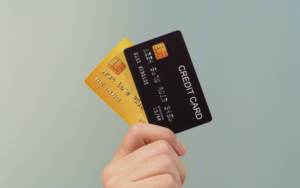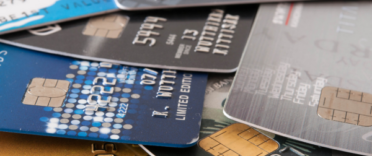 The type of card you use to pay for something can make a big difference to the eventual cost. Some purchases can earn you great rewards if you use a credit card, while others can save you money if you use a debit card. It is important to understand when to use a credit card vs a debit card as the wrong choice could leave you with a hefty bill, a missed opportunity or in the worst case, problem debt that can be difficult to shift. In this article, we explain the difference between a credit and a debit card and how to make the right credit vs debit card call.
The type of card you use to pay for something can make a big difference to the eventual cost. Some purchases can earn you great rewards if you use a credit card, while others can save you money if you use a debit card. It is important to understand when to use a credit card vs a debit card as the wrong choice could leave you with a hefty bill, a missed opportunity or in the worst case, problem debt that can be difficult to shift. In this article, we explain the difference between a credit and a debit card and how to make the right credit vs debit card call.
Which should you use – debit card vs credit card?
Here are some examples of when it is best to use a credit card and when it is best to use a debit card:
| Debit card | Credit card |
| To withdraw cash
To control your spending |
To spread the cost of big purchases
To book holidays and travel To earn rewards To improve your credit score |
How does a credit card work?
A credit card allows you to borrow money from the card provider to pay for goods and services. You are then required to make at least the minimum payment each month, however, it is best to clear the balance in full, if possible, as any outstanding balance will grow with interest.
Your credit card will have a credit limit, which dictates the maximum amount your balance can grow to at any one time. Going over the credit limit could mean you have to pay a fee. We have more information on how credit cards work in our article ‘How do credit cards work?’.
There are multiple different types of credit card, with each one designed for a different financial need. This could be earning rewards on your spending, consolidating debt or spreading the cost of a big purchase. We cover the different types of credit cards in our article ‘Credit card types explained: What are the different types of credit cards?’.
How does a debit card work?
Your debit card is linked to your current account, so when you use the card, payments are made from the available funds in your bank account. Because you are spending your own cash, you will not have to pay any interest when you use a debit card. However, if you spend more than what is available in your current account, you could enter an unarranged overdraft with your bank and be charged interest on the amount you are overdrawn by.
What is the difference between debit and credit cards?
The fundamental difference between paying for something with a debit card vs a credit card is that you are using your own money for the purchase. If you use a credit card, the money comes from your card provider and will need to be repaid later.
When to use a credit card
There are many reasons to use a credit card, including some of the options below. If you are unsure whether a credit card would suit your financial circumstances, check out our article ‘Should I get a credit card?’.
To spread the cost of big purchases
A credit card can help you spread the cost of a big purchase over a longer period of time, sometimes up to three years. On a standard credit card, you will usually be given a grace period in which to clear the balance in full before being charged interest, however, this might not be possible when making a large purchase. Instead, you may be able to get a 0% credit card, which will give you a much longer period to clear your debt before any interest kicks in. This means you could pay for a holiday, a sofa, a washing machine or any other pricey item, then split the cost over several months without paying interest.
You can read more in our article ‘What does 0% interest, or APR, mean on a credit card?’.
You can also benefit from additional purchase protection, as the card provider is legally considered equally liable with the retailer for a faulty purchase. Under Section 75 of the Consumer Credit Act, you will be due a refund if a purchase between £100 and £30,000 is faulty or is not delivered at all.
To book holidays and travel
You have likely heard at least one horror story of someone losing thousands when an airline goes bust or travel plans have to be rearranged. One way to avoid being a victim of this kind of scenario is to pay for your holiday or travel with a credit card. If the supplier goes out of business, but you have paid on your credit card, you would be covered by Section 75 of the Consumer Credit Act if the purchase cost is between £100 and £30,000.
Read more about section 75 in our article ‘Section 75 of the Consumer Credit Act explained – plus how to claim’.
To earn rewards
You can earn valuable rewards, air miles and cashback by spending with a credit card. Every pound you spend will convert to a form of reward points or percentage of cashback. Some cards will also offer bonus rewards for spending over a certain amount within a specific timeframe. If you know that you will pay off your balance at the end of the month – and therefore not pay any interest – a rewards card can be a great way to make your everyday spending pay.
Check out our page ‘Compare the best rewards credit cards in the UK’ and read our ‘Which are the best cashback credit cards UK? Earn while you spend’ article to find the best deals.
Unfortunately, most rewards cards charge a relatively high rate of interest. This means that not repaying what you owe in full at the end of the month could quickly lead to the cost of interest payments outweighing the value of any rewards.
To improve your credit score
Using a credit card when you have a poor credit score or limited credit history could help you improve your credit score and access a wider range of lending options. Regularly using a credit card and paying off the balance in full every month will be recorded on your credit report, meaning you could be viewed as a trustworthy and reliable borrower when lenders run a credit check in the future.
Learn more about using a credit-builder card and find the best deals on our ‘Compare the best credit cards to build credit and improve bad credit’ page.
How to find out which credit card is best for you
Money to the Masses uses Creditec*, an online comparison service that enables you to find credit card deals tailored to you without affecting your credit score. You will want to compare as many different options as possible before you get a new credit card, so it is a good idea to do a fast online comparison. With only a few basic details, the Creditec tool will build a personalised list of credit cards suited to your needs to help you navigate the huge number of options out there. You can then pick the result that suits you best. None of this will affect your credit score as the eligibility process uses a soft credit check. Click here to start your comparison*.
When to use a debit card
In some cases, using a debit card will be the most cost-effective and practical way to pay. Here are some examples of when to use your debit card vs a credit card.
To withdraw cash
Always use a debit card to withdraw cash at a cashpoint. It is usually free to withdraw cash with a debit card, unless the ATM itself charges a fee. If you use a credit card, you will start paying interest on that cash immediately and could face a hefty one-off fee in addition. This means that the cash will cost you extra money even if you clear your credit card balance immediately. Opting for a debit card when drawing out cash will save you money and simplify the process.
To keep control of your spending
Spending on a debit card means you can limit your spending to money you actually have in your bank account. With a credit card, there is a danger that you can overspend and fall into debt, especially if you have a high credit limit. There will always be a temptation to put something on your credit card and worry about it later, which is a dangerous attitude to spending money. A debit card should allow you to monitor how much is going in and out of your bank account through online banking and monthly statements and help you to stick to a budget.
If you are already in debt, it can be a mistake to spend on a credit card and risk slipping into a debt spiral. You can find out more about how to get free advice on debt in our article ‘Where to get free debt advice’.
Pros and cons of spending on a credit card
Here are the main advantages and disadvantages to spending using a credit card.
Pros of using a credit card
- Spread the cost - Buy something today, but pay for it over multiple months.
- Earn as you spend - Access greater rewards and cashback just for using your credit card on everyday spending.
- Free borrowing - No interest charges if you clear the balance by the end of the month, or longer with a 0% purchase credit card.
- Build a credit history - Get access to a wider range of credit options and better deals by building a history as a reliable borrower.
- React to fraud - You will have time to spot any fraudulent payments and report them before you pay your bill and the money comes out of your bank account. Fraudulent debit card transactions can be reversed, but the money will be gone in the meantime.
- Purchase protection - Under Section 75 of the Consumer Credit Act, your money is safe if something goes wrong with a purchase between £100 and £30,000.
Cons of using a credit card
- Chance of falling into a debt spiral - If you are already in debt or have a history of struggling to repay debt, a credit card could make your problems worse.
- Potential to damage your credit score - New credit applications and missed payments will be recorded on your credit report. Too many of either will make it harder to borrow money in the future as lenders may see you as an unreliable borrower.
- Interest payments - Unless you are on a 0% interest rate introductory deal – which do not last forever – or you clear your balance at the end of every month, you will need to pay interest on your spending. Standard interest rates on credit cards can be high and can quickly add up.
- Fees and charges - Credit cards can charge annual fees, fees for transferring a balance from another credit card, late payment charges, foreign transaction fees and charges for withdrawing cash.
- Not accepted everywhere - You cannot pay for everything with a credit card, plus some establishments will not accept certain types of credit card.
Pros and cons of a debit card
Here we have summarised the main advantages and disadvantages of spending with a debit card.
Pros of using a debit card
- Fees and charges - Most debit cards do not require you to pay a fee, though some current accounts will charge you delivery costs for a physical debit card and others will require a monthly fee as part of having a current account.
- Withdraw cash for free - Unless the ATM company charges a fee for withdrawals, you should be able to take out cash with a debit card for free.
- Lower debt risk - It is harder to get into debt if you are spending money on your debit card vs a credit card, though it is not impossible. The balance on your current account should help you restrict your spending to the money you have, rather than the amount you are able to borrow. However, if you spend beyond your current account balance, you will go into an overdraft, which can be an expensive way of borrowing money.
- Can be used almost anywhere - You can pay for almost anything with a debit card. The main exception would be if a vendor requires cash, but you could then use your debit card to withdraw the cash you need for free.
- Purchase protection - Many debit card providers, including the main UK suppliers Mastercard and Visa, will refund you if you do not get the goods or services you paid for under the chargeback scheme. This is not a legal protection like Section 75, but it is written into the providers’ own rules.
- Simple application process - It is generally easier to open a current account and get a debit card than to successfully apply for a credit card. Even if you have a bad credit history that could prevent you from getting a credit card, you should be able to open a current account and access a debit card.
Cons of using a debit card
- Spending restrictions - With a debit card, you can usually only spend what is in your current account. A credit card will let you spend more than what you have, though you would be at risk of falling into more debt if you cannot repay the money.
- Purchase protection - Debit card transactions are not protected by Section 75, though they are covered by the chargeback scheme.
- Rewards - You will not get the same level of rewards through spending on a debit card vs a credit card, especially when compared to the best rewards credit cards. However, some current accounts do offer cashback on certain debit card spending and rewards such as a cash bonus for switching to that current account, free cinema tickets or a free streaming subscription.
- Interest - If you spend more than the balance of your current account and enter an unarranged overdraft, you will likely be charged a high interest rate on the overdrawn amount.
- Fees and charges - Some current accounts will charge a monthly fee, require a minimum monthly deposit or charge you for delivery to get a debit card.
If a link has an * beside it this means that it is an affiliated link. If you go via the link Money to the Masses may receive a small fee which helps keep Money to the Masses free to use. But as you can clearly see this has in no way influenced this independent and balanced review of the product.







